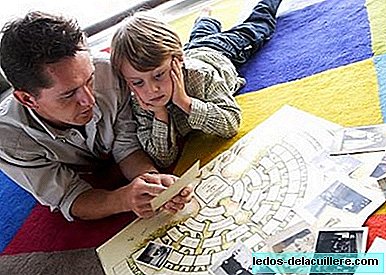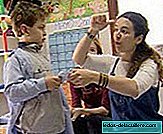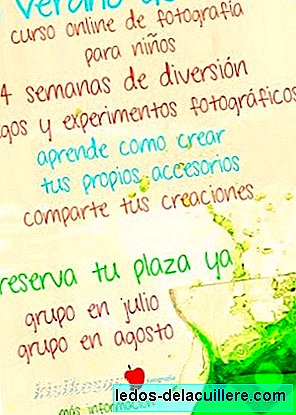
I firmly believe that children are good people, as Carlos Gonzalez says and as my experience as a mother and friend has shown me. However, developing responsible behavior is not something innate, you learn. We have to educate children to be responsible.
Parents are the main teachers of this behavior and the foundations are laid not with slapping, but creating from babies a respectful environment with the child and with others. The way to do it is to show in a practical way empathic attitudes rather than demanding them and acting ourselves according to what we consider good. The example is the key and the relationship with the children, our way of treating and talking to them, what the child will assimilate as just what he should do, whatever we say.
It is in the day to day when parents can teach the basis of responsible behavior and that will become a habit if the environment promotes it. It is taught with words, but especially with facts. A father can't scream if the screams are wrong. Can't hit, if hitting is wrong. You cannot make fun of the child's fears or mistakes, if that is wrong. You should not get impatient if losing patience is wrong. You should not insult, you should not threaten, you should not act or speak disparagingly of your child or anyone. Respect is not demanded, it is earned. It is not sent, it is taught with respect.

And when we are wrong, what will happen to us, since fathers and mothers are human, the most respectful thing is to apologize, especially to our children, to teach them that in the face of error, the apology is the best weapon, not pride or abuse of power. Be able to ask for forgiveness It makes us bigger and more worthy of respect, it is perhaps the best teaching we can give them.
The best sign of responsibility is to be able to assume your own mistakes and apologize for them. If we do not, we will not be able to demand the same from children.
Parents, in addition, we must show respect towards others actively. If we show a constant behavior of respect towards the opinions of others, the properties of others and people, in general, our children will experience that this is the correct behavior.
The ridicule of others is over, spitting in the street, throwing the butts to the ground, insulting, screaming furiously in the traffic jams, not giving way when entering the portal. You have to set an example, that is. Our daily actions, attitudes, actions and social skills are much more effective than any sermon.
Of course, the word is a way to reinforce and explain our behavior. When we give way, or pick up a paper that another threw in the park, we will explain to the child, however small, the reason we do it. The examples are many, and surely you can find them in your daily experiences.
We can also rely on telling them didactic stories, without them having to appear truculent dramas. There are many story books that tell situations in which people behave with honesty and tenderness. They are an excellent reinforcement and usually convey that good actions always have consequences and bad ones hurt even those who perform them.

Talking with children is very important, always. Nothing is more valuable in the long run than encouraging fluid and confident communication. That is paid since they are little. We can not wait for a teenager to come to tell us about his care if, when he was a child, any problem that he explained to us seemed stupid, banal and boring.
If we never had time, patience and empathy with the little boy, if we scolded him more than understand him when he interrupted us with his little problems, he will never do it again. Responsibility, as I said, is taught by being responsible. Our responsibility as parents is to serve our children with true concentration. That of telling the children to shut up, that they are heavy, that they do nothing but bother, that they go nonsense worry them, it is one of the worst mistakes we can make.
It's a good idea to spend some time every day talk to the children, calmly, without pressing or questioning them. Especially when schools begin it is very possible that they are reluctant to tell us about the things they have done, that avoid the issue. Do not overwhelm them. Everything comes. Keep in mind that the school or the nursery are very new environments in which the child is out of place at the beginning. They meet new authority figures, new rules and new conflicts that they may not know how to resolve. In those moments it is when you have to know how to be by your side and not to ignore those small details that are gradually entrusting us, giving what happens to them the importance that they have, not minimizing the fears or problems to which is facing
In the conversations we have and in our daily activity it is convenient to talk about the feelings, both good and bad, so that they know how to give them names and understand what happens to them. Being courageous, considerate, compassionate, honest and kind are character traits that, if we look, we can identify in our environment. Valuing these qualities openly will help our children identify and value them as well.
Of course, children, in addition to the enormous desire to be good people and make others happy, will have to face negative feelings: anger, anger, jealousy, resentment and loneliness are also part of their experiences. They, without the protective shield of experience and contention that we adults have, will suffer them with enormous power. They won't know how to deal with them at the beginning. They will overflow. And we have to contain them, not repress or punish them.
We have, then, to endure the urge to label them as "bad", to tell them that they should not feel what they feel or even tell them that those feelings are bad. They are not. They are part of human nature. We all feel anger or fear, which are usually very close. What is not correct is to channel these emotions in ways that harm us or harm others. It seems complicated, but it's simple if we do that healthy exercise of putting ourselves on your skin.
When a child has a negative feeling, he is usually full of fear, deep down as we all are. Let us think that they are afraid of losing their parents' love, of being abandoned, of being rejected. Let's empathize with them. Understanding the nature of these negative emotions helps us identify them and heal their consequences.
One way to address this is the practice of empathy, as I have pointed out. First, since they are babies, we exercise it, teaching them in a palpable way and also explaining that we respect their feelings and their needs. Our role is to strive to meet those needs, including and especially the emotional ones of physical contact and tenderness. Then, when they grow up, we should encourage them to share their feelings with us, explaining that other people may also be afraid or sad, as they sometimes are.
It is not a fast road, nor an infallible recipe. I cannot guarantee that it will work 100%. It is not a "method" that you are going to sell in a book as if it were miraculous. It involves a lot of work on our part. But it is how people are treated and how people want to be treated, whether they are children or adults. And it is the only way in which one truly understands, in the heart, what it is to be responsible and empathic with others.












